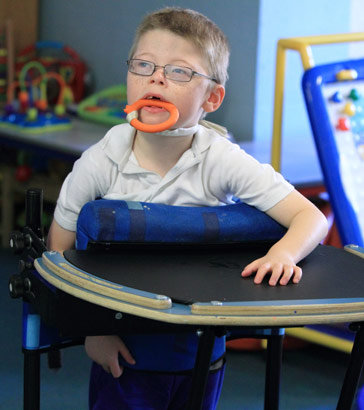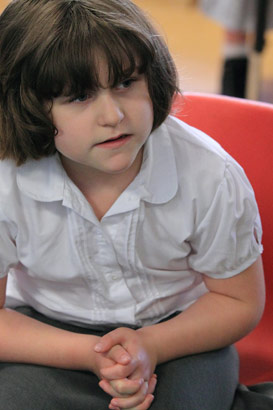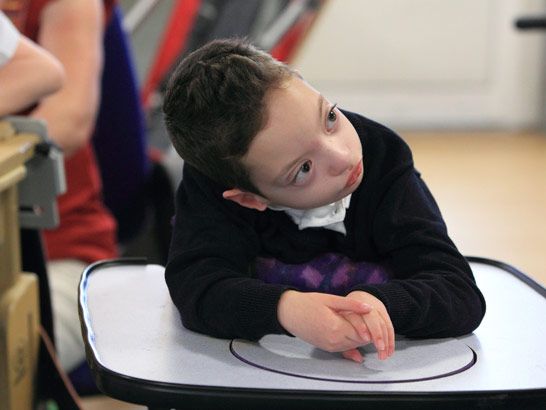Early intervention is best conceptualised as a system designed to support
family patterns of interaction that best promote children's development.
Guralnick, 2001
'Early intervention' can be taken to mean either:
- action taken early in life
- action taken early in the onset or at the diagnosis of impairment
...the large majority of early intervention activity is initiated during the first three years of life.

Shonkoff and Meisels describe the scope of early intervention:
...to promote child health and wellbeing, enhance emerging competencies,
minimize developmental delays, remediate existing or emerging disabilities,
prevent functional deterioration and promote adaptive parenting and overall
family functioning. These goals are accomplished by individualized developmental,
educational and therapeutic services for children provided in conjunction
with mutually planned support for their families.
Shonkoff and Meisels 2000, in Newman et al, 2010
Early intervention is not just about providing support for disabled children
and their families early in childhood. Disabled children and their families
need properly coordinated support, delivered as soon as they need it,
particularly at key transition points in their lives, and they need services
and support to respond quickly when their circumstances or a child's condition
changes.
HM Treasury/DfES,
2007
Early support...is essential to prevent problems such as deteriorating
health, family stress and breakdown, children potentially being placed
in care, and deteriorating emotional and social development for disabled
children and their siblings.
HM Treasury/DfES,
2007
Early intervention means professionals working in partnership with parents
of children with special needs to help their children develop their knowledge
and skills to reach their potential. It builds upon the strengths found
in all children and families.
Research and practice have proven that early intervention produces immediate
and long term benefits for children with disabilities, their families,
and society.
Carpenter, 2001
The key goals of early intervention are:
- To support families in supporting their children's development.
- To promote children's development in key domains (cognitive, social, physical, emotional, linguistic) via early years curriculum and learning opportunities.
- To promote children's coping confidence.
- To prevent the emergence of future problems.
Wolfendale, 2000

An effective early intervention programme should:
- Be based on a child developmental framework.
- Take a systems perspective, in which all aspects relate and are fully integrated.
- Be evidence-based.
- Be personalised.
- Be child- and family-centred and participative.
- Value families and professionals.
- Work to shared agenda and shared goals.
- Be proactive in identifying risks and concerns.
- Be overviewed, monitored and evaluated with opportunities for child/family feedback.
- Accommodate cultural differences.
Based on Guralnick, 2005
early intervention programmes

Families value the following features of early intervention programmes:
- A full statutory-voluntary sector mix.
- Early and sympathetic diagnosis and intervention.
- A 'whole' family approach in partnership.
- Simplicity rather than complexity.
- Aspirational features of services.
- Intensive and persistent interventions – as long as excessive demands were not made of carers, especially mothers.
Parents valued family-centred services delivered by skilled, knowledgeable
and efficient professionals, especially where key workers were part of the
overall package... [Keyworkers] are associated with better family relationships,
quicker access to financial benefits and reduced parental stress.
Based on Newman et al, 2010
and challenges

Key reciprocal functions of early intervention:
- Support
- Education
- Liaison
- Communication
- The provision of information
- Collaboration
- Resources
- Advice
Carpenter, 2004
Major accomplishments of early intervention
- Parent-child transactions
- Centrality of family centred approaches
- Family orchestrated child experiences
- Effectiveness: evidence from model programmes
Guralnick, 2007
Challenges to early intervention programmes
- Inclusion
- Practice models
- Styles of partnership
- Family-based intervention
Carpenter, 2004
intervention
into practice

Identify the key elements of early intervention, and draw up a plan, including specific actions, of how you could apply them for the families of the children and young people you work with.

Guralnick (2007) 'Future directions in early intervention'. Paper to the second International Society on Early Intervention held in conjunction with the University of Zagreb's 7th Annual Scientific conference 'Research in education and rehabilitation science', Zagreb, Croatia (14-16 June).
Carpenter, B. (2004) 'Early Intervention: A 21st-century concept or a lost cause?'. Paper presented to the European Conference on 'The European Dimension of Special Education: Emergence of a Different Profile', Thessaloniki, Greece (November).
Guralnick, M.J. (2005) 'Early intervention for children with intellectual disabilities: current knowledge and future prospects', Journal of applied research in intellectual disabilities, 18 (4), 313-324.

Newman, T., McEwen, J., Mackin, H. and Slowley, M. (Barnardo's Policy and Research Unit) (2010) Improving the Wellbeing of Disabled Children (up to Age 8) and their Families through Increasing the Quality and Range of Early Years Interventions. London: Centre for Excellence and Outcomes in Children and Young People's Services (C4EO).